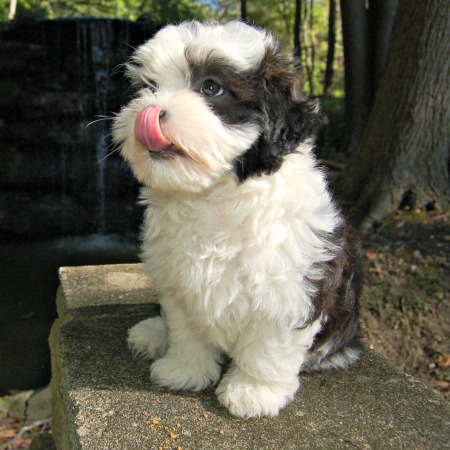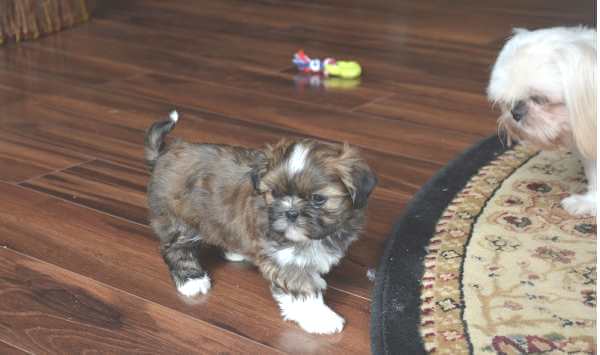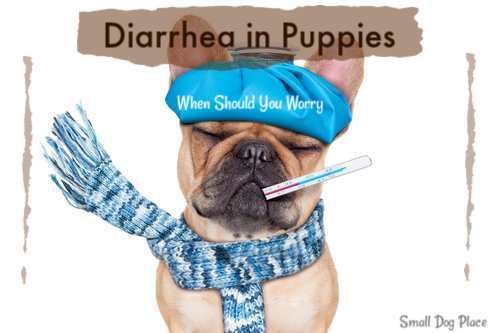Puppy Diarrhea: Should you be Concerned?
By Janice Jones | Last medically reviewed and updated: December 2025
The first splatter on the floor is unsettling enough, but the genuine concern is what it might mean. Puppy diarrhea can range from a simple food change to a life-threatening infection like Parvo. Because puppies dehydrate far more quickly than adult dogs, loose stool should never be ignored.
This updated guide explains the causes, when to worry, how to treat diarrhea safely at home, and what new veterinary research reveals about puppy gut health.
This article is for educational purposes only. Diarrhea in puppies can become serious very quickly. If your puppy is lethargic, vomiting, refusing food or water, has bloody stool, or is under 12 weeks of age, contact a veterinarian immediately.
What is Puppy Diarrhea?
Diarrhea is the frequent passage of loose or watery stool. In puppies, it’s a symptom, not a disease. Their digestive system is immature, their immune system is still developing, and their gut microbiome is fragile—making them highly prone to intestinal upset.
Common features of puppy diarrhea include:
- Increased stool volume
- Looser or watery consistency
- Accidents in the home
- Urgency or straining
Although diarrhea is common, any episode in a young puppy deserves attention, especially if vomiting, lethargy, or dehydration occur.
 Puppy Diarrhea
Puppy DiarrheaPuppy vs. Adult Dog Diarrhea
Anything that causes diarrhea in puppies can also affect adults, but older dogs have additional causes, including:
- Medication side effects (especially antibiotics)
- Pancreatic disorders
- Liver or thyroid disease
- Chronic conditions such as colitis or inflammatory bowel disease
- Certain cancers
Puppies tend to get acute diarrhea from infections, parasites, food issues, or stress; adults more often develop chronic diarrhea from underlying disease.
What Causes Diarrhea in Young Puppies?
Puppy diarrhea has five primary categories of causes:
- Dietary Changes & Food Intolerance
- Ingesting Something Inappropriate
- Internal Parasites
- Viral or Bacterial Infections
- Stress and Environmental Change
We’ll explore each with updated veterinary insights.
Abrupt Diet Change or Food Intolerance
Puppies have delicate digestive systems. Even a “healthy upgrade” in food can cause diarrhea if introduced suddenly.
Recent studies on the puppy gut microbiome show:
- Puppies have low microbial diversity, making them extremely sensitive to diet changes.
- A sudden switch—even to higher-quality food—can disrupt the gut bacteria and trigger diarrhea.
Common Triggers
- Switching foods within a day or two
- Feeding rich treats shortly after adoption
- Overfeeding or inconsistent mealtimes
- Introducing new proteins too quickly
Prevention
- Ask the breeder for a bag of the puppy’s current food.
- Transition slowly: ¼ new food added every 2 days.
- Keep puppies on puppy-formulated food, not adult diets or raw diets.
Ingesting Something They Shouldn’t
Puppies explore the world with their mouths. Their scavenging instincts, still present from their wild ancestors, lead them to taste anything interesting.
They commonly eat:
- Grass, leaves, mulch, dirt
- Toys, socks, rocks
- Houseplants
- Human food or trash
- Chemicals or toxins (dangerous)
If the substance is toxic or irritating, diarrhea is an early warning sign. If the object is solid, a bowel obstruction is possible.
Updated Veterinary Advice
Restricting access during the “mouthy” phase dramatically reduces risk. Puppy-proofing prevents 80% of cases of foreign-object diarrhea.
Internal Parasites
Parasites remain one of the top causes of puppy diarrhea.
Common offenders:
- Roundworms
- Hookworms
- Whipworms
- Coccidia (protozoa)
- Giardia (protozoa)
New Research (2021–2024)
- CAPC reports show Giardia cases are rising each year, especially in puppies and in shelter environments.
- Protozoa like Coccidia often flare during times of stress—such as rehoming or travel.
- Hookworm resistance to common dewormers has emerged in several U.S. regions.
What this means for you:
- A single deworming isn’t enough.
- A fecal test (or fecal PCR test) is the only way to detect all parasites.
Viral and Bacterial Infections as a Cause of Puppy Diarrhea
These are the most serious causes, and puppies are especially vulnerable.
Parvovirus (Parvo):
A life-threatening viral disease that causes:
- Bloody diarrhea
- Vomiting
- Lethargy
- Fever
- Dehydration
New Updates (2022–2024)
- New variants (CPV-2b & CPV-2c) may cause diarrhea before vomiting.
- PCR testing is now the preferred diagnostic tool because it detects infection earlier than traditional ELISA snap tests.
Distemper
Begins like a respiratory infection, later causing vomiting, diarrhea, neurological symptoms, and death in severe cases.
Both diseases, Distemper and Parvo, are preventable with vaccinations.
Bacterial Infections (Updated Research)
The most common bacterial culprits:
- Campylobacter
- Salmonella
- E. coli
- Puppies fed raw diets face a significantly higher risk of Salmonella and Campylobacter infection.
- These infections are zoonotic, meaning they can spread to humans.
If your puppy has diarrhea and was fed raw food, fecal testing is strongly recommended.
Stress-Induced Diarrhea
The first 72 hours in a new home are the highest-risk time for puppy diarrhea.
Modern behavioral research shows that stress hormones alter gut motility and temporarily destabilize the microbiome, leading to loose stool.
Stress triggers include:
- Rehoming
- Airplane or car transport
- New people or dogs
- Overhandling
- Loud noises
- Too much excitement
- Common stress signals:
- Lip licking
- Yawning
- Turning the head away
- Hiding
- Tucked tail
This type of diarrhea usually resolves with rest, quiet time, and routine, but should still be monitored closely.
 This puppy is stressed: He is licking his lips as a calming mechanism.
This puppy is stressed: He is licking his lips as a calming mechanism. This puppy is obviously stressed. She won't look at the camera.
This puppy is obviously stressed. She won't look at the camera. Diarrhea in puppies can be caused by stress. This puppy is stressed and is using yawning as a calming mechanism.
Diarrhea in puppies can be caused by stress. This puppy is stressed and is using yawning as a calming mechanism.Supportive Care for Mild Puppy Diarrhea (When Your Vet Has Ruled Out Emergencies)
These steps are intended for mild, short-term diarrhea in alert, eating puppies who are not showing emergency warning signs. When in doubt, consult a veterinarian first.
When to Call a Veterinarian Immediately
Seek urgent veterinary care if your puppy has:
- Bloody diarrhea
- Diarrhea + vomiting
- Diarrhea lasting more than 24 hours
- Refusal to eat or drink
- Lethargy or wobbliness
- Black, tarry stool (internal bleeding)
- Known exposure to Parvo
- A toy breed under 5 lbs with sudden diarrhea
Puppies can dehydrate within hours, not days.
At-Home Treatment (Only for Mild, Short-Term Diarrhea)
Use these steps only when you are sure the cause is mild (a diet change, stress, or a minor indiscretion).
1. No Fasting for Small or Toy Breeds:
Older recommendations suggested a 12–24-hour fast; however, the new veterinary consensus states that toy breeds can become hypoglycemic and that fasting is unsafe.
Medium + large breed puppies may fast for 6–12 hours only if recommended by a veterinarian.
2. Hydration Is Critical
Puppies must have constant access to water.
Updated hydration guidelines:
- Use canine-specific oral electrolyte solutions, not human Pedialyte (different electrolyte balance).
Options include:
- Rebound Recuperation
- HydraCare
- Oralade GI Support
Dr. Robert Silver of the Boulder's Natural Animal recommends a rice water diet.
"To make rice water, boil one cup of white rice in four cups of water for 15 to 30 minutes (depending on your altitude) or until the water turns creamy white.
Decant the liquid and allow it to cool. You can serve the rice water to your dog as often as she will drink it. If she isn’t interested, mix a teaspoon of chicken baby food (or another flavor that your pet likes) in the rice water to increase its palatability.
(Hint: One cup of white rice makes a lot of rice water!)"
3. Bland Diet
The traditional chicken and rice is still acceptable, but veterinarians now prefer commercial gastrointestinal diets:
- Hill’s i/d
- Purina EN
- Royal Canin Gastrointestinal Puppy
These diets contain prebiotics, balanced minerals, and proper protein levels for healing.
Continue the bland diet for 2–3 days, then transition back to regular food slowly.
4. Probiotics
Probiotics restore healthy gut bacteria disrupted by stress, antibiotics, or diet change.
Common veterinarian-recommended brands:
- FortiFlora
- Bene-Bac
- Proviable
- Purina Calming Care (stress + GI support)
Probiotics are safe for long-term use.
5. Canned Pumpkin
Plain canned pumpkin (not pie filling) can help regulate stool consistency.
Give:
1 teaspoon for small puppies
1–2 tablespoons for larger puppies
Stool Color Meaning Chart
| Stool Color | What It May Mean | What You Should Do |
|---|---|---|
| Light Brown / Tan | Normal stool color and consistency. | Continue to monitor; no action needed. |
| Yellow / Mustard | Food intolerance, rapid food change, or GI irritation. | Switch to a bland diet and call your vet if it lasts more than 24 hours. |
| Green | Eating grass or rapid transit through the intestines. | Monitor closely. Call your vet if it persists or your puppy seems unwell. |
| Orange | Bile duct irritation or fast movement through the GI tract. | Schedule a vet visit if it continues beyond 24 hours. |
| Gray / Greasy | Possible pancreas problem or poor fat digestion. | Call your veterinarian for an exam and testing. |
| Black / Tarry | Digested blood from higher up in the GI tract (internal bleeding). | Emergency: Go to a veterinarian immediately. |
| Bright Red Streaks | Fresh blood from the colon or rectum, colitis, parasites, or straining. | Vet visit recommended; a stool sample will likely be needed. |
| Bright Red / Bloody Water | Severe colitis, hemorrhagic diarrhea, or Parvo. | Emergency: Seek immediate veterinary care. |
| White Specks | Possible tapeworm segments or other parasites. | Take a stool sample to your vet for parasite testing and treatment. |
Serious Cases of Puppy Diarrhea
If your puppy has:
- Watery diarrhea
- Bloody stool
- Diarrhea + vomiting
- Refuses food or water
- Extreme lethargy
This is a medical emergency. Parvo, hemorrhagic gastroenteritis, and dehydration can be fatal without rapid treatment.
An Ounce of Prevention is Worth a Pound of Cure
Prevention: How to Keep Puppy Diarrhea Away
Updated recommendations include:
- Follow your veterinarian’s vaccination schedule
- Perform fecal testing at least twice during puppyhood
- Keep play areas clean
- Avoid dog parks until fully vaccinated
- Puppy-proof the home and yard
- Transition foods gradually
- Reduce stress during the first week home
- Avoid raw diets in puppies (increased risk of bacterial infections)
- Keep a probiotic supplement on hand
Consistency and prevention dramatically reduce diarrhea episodes.

More About Janice (author and voice behind this site)
Janice Jones has lived with dogs and cats for most of her life and worked as a veterinary technician for over a decade.
She has also been a small-breed dog breeder and rescue advocate and holds academic degrees in psychology, biology, nursing, and mental health counseling.
Her work focuses on helping dog owners make informed, responsible decisions rooted in experience, education, and compassion.
When not writing, reading, or researching dog-related topics, she likes to spend time with her six Shih Tzu dogs, her husband, and her family, as well as knitting and crocheting.
She is also the voice behind Miracle Shih Tzu and Smart-Knit-Crocheting

Free Monthly Newsletter
Sign Up for Our Free Newsletter and get our Free Gift to You.
my E-book, The Top 10 Mistakes People Make When Choosing a Dog (and how to avoid them)


